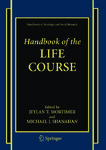Handbook of the Life Course
Abstract
The development of the life course as a field of study parallels in some respects another
prominent subfield of sociology, social psychology. In his now-classic assessment, House
(1977) observed that social psychology’s highly general and abstract concepts are well suited
to elucidate a broad range of phenomena. As a result, however, social psychological theorizing
and research had tended to “dissipate” across several academic disciplines and many
applied areas of research. These circumstances presented a challenge to social psychologists
in their efforts to maintain a core identity and to evaluate the development of their field.
A similar situation may be said to characterize the contemporary literature surrounding
the life course. As a concept, the life course refers to the age-graded, socially-embedded
sequence of roles that connect the phases of life. As a paradigm, the life course refers to an
imaginative framework comprised of a set of interrelated presuppositions, concepts, and
methods that are used to study these age-graded, socially embedded roles. In this relatively
new subfield of the social sciences, a common core of generalized concepts and premises is
now taking hold and giving definite form to the life course paradigm. As with social
psychology, the generalized nature of this paradigm has led to its diffusion across diverse
problem areas. Indeed, the utility of the life course for the study of a wide range of temporally
structured phenomena is clearly demonstrated by the contributions to this volume from
leading specialists in their subfields.
Further paralleling the circumstances of social psychology, academic infrastructures are
not conducive to the recognition and development of life course studies as a field. Academic
specializations, departments, professional societies, and scholarly journals all tend to promote
a focus on single age groups or particular life phases (e.g., adolescence or old age). This
emphasis is not in accord with the life course paradigm’s central premise—that no period of
life can be understood in isolation from people’s prior experiences, as well as their aspirations
for the future. Thus, whereas the life course has proven highly useful in the study of lives, it
likewise tends toward the “organizationally challenged.”
Collections
- School of Humanities [47]

